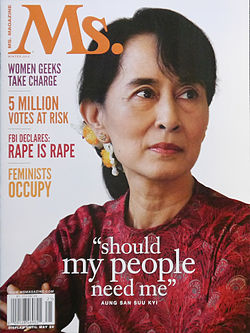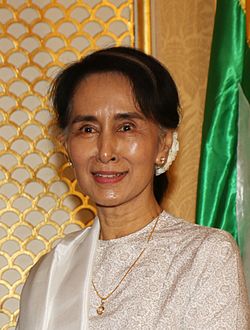Aung San Suu Kyi
This article may be too technical for most readers to understand. (December 2011) |
Aung San Suu Kyi on Nobelprize.org Aung San Suu Kyi (born 19 June 1945 in Yangon, Burma) is a human rights activist, Nobel Peace Prize winner, and State Counsellor of Myanmar.
Suu Kyi was not able to be president. Instead, she became the State Counsellor of Myanmar.[2] She brought some democracy to her country with nonviolence. She is the leader of the National League for Democracy in Burma and a famous prisoner. She has been under house arrest several times. Suu Kyi won the Rafto Prize and the Sakharov Prize in 1990, and the Nobel Peace Prize in 1991. In 1992, she was awarded the Jawaharlal Nehru peace prize.
She is sometimes called Daw Aung San Suu Kyi. Daw is not part of her name, but a title for older women. This name shows respect for her.[3]She's called Amay Suu by the people, meaning Mother Suu.
On 1 February 2021, Aung San Suu Kyi was arrested and removed from power by the military during a coup d'état. The military accused the November 2020 Myanmar general election results fraudulent.[4] On February 3, she was accused as violating Myanmar's import laws [5] On February 16, Myanmar police filed a second criminal charge against her, this time for violating the country's Natural Disaster Law[6]and Military accused with many other cases like having a walkie talkie. However, nearly all of the case military accuse are not trusted by the people of Myanmar.[citation needed]
Personal life[edit]
Aung San Suu Kyi was the third child in her family. Her name "Aung San" comes from her father, who is also named Aung San; "Kyi" comes from her mother; and "Suu" comes from her grandmother.[7]
Her father helped to make Burma independent from the United Kingdom in 1947. He was killed in the same year. She grew up with her mother, Khin Kyi, and two brothers, Aung San Lin and Aung San Oo in Yangon. One of her brothers, Aung San Lin, drowned when Suu Kyi was eight.[7] Her other brother, Aung San Oo currently lives in San Diego, California and is an American citizen.[7]
Suu Kyi went to Catholic schools for much of her childhood in Burma. She learned English in school.
Khin Kyi, Suu Kyi's mother, became famous as a politician. She became the Burmese ambassador to India in 1960. Aung San Suu Kyi went to college in India at the Lady Shri Ram College for Women in New Delhi.[8] Suu Kyi continued her education at St Hugh's College, Oxford, and learned about philosophy, politics, and economics. She also went to the School of Oriental and African Studies at University of London in the 1980s.
She moved to New York and worked at the United Nations. In 1972, Aung San Suu Kyi married Michael Aris (1946-1999), a professor of Tibetan culture who lived in Bhutan. She had met Aris when they were both students at Oxford. In 1973, she gave birth to her first son, Alexander, in London; and in 1977 she had her second son, Kim.
Political beginnings[edit]
Aung San Suu Kyi returned to Burma in 1988 to take care of her sick mother. That year, the long-time leader of the socialist ruling party, General Nay Win, stopped being a politician.
She admired Mohandas Gandhi's use of nonviolence.[9][10] She was also inspired by Buddhism.[11] Aung San Suu Kyi worked for democracy and helped make the National League for Democracy on September 27th 1988.
Because Suu Kyi was fighting against the government, she was asked to leave the country, but she did not.
House arrest and release[edit]
She was arrested in 1989 and placed in prison in 1990. This was after an election which her party, the National League for Democracy, won, but they were not allowed to be in charge of the country. Between 1990 and 2010, she was almost always in her home, which is called house arrest. Burma released her in November 2010. Suu Kyi was going to be released in 2009, but when a man was found entering her home, she was kept on house arrest for another year because she had broken the rules of the house arrest.
Time as a politician[edit]
After she was released from house arrest, she was elected to be State Counsellor. When she was State Counsellor, Burma had serious problems with the genocide of the Rohingya.
Political belief[edit]

When she was asked what democratic models Myanmar could look to, she said: "We have many, many lessons to learn from various places, not just the Asian countries like South Korea, Taiwan, Mongolia and Indonesia." She also cited "the eastern European countries, which made the transition from communist autocracy to democracy in the 1980s and 1990s, and the Latin American countries, which made the transition from military governments. "And we cannot of course forget South Africa, because although it wasn't a military regime, it was certainly an authoritarian regime." She added: "We wish to learn from everybody who has achieved a transition to democracy, and also ... our great strong point is that, because we are so far behind everybody else, we can also learn which mistakes we should avoid."[12]
Book[edit]
Authored[edit]
- Letters from Burma (1998) with Fergal Keane ISBN 978-0140264036
- The Voice of Hope (1998) with Alan Clements, ISBN 978-1888363838
- Freedom from Fear and Other Writings (1995) with Václav Havel, Desmond M. Tutu, and Michael Aris, ISBN 978-0140253177
- Der Weg zur Freiheit (1999) with U Kyi Maung, U Tin Oo, ISBN 978-3404614356
- Letter to Daniel: Despatches from the Heart (1996) by Fergal Keane, foreword by Aung San Suu Kyi, edited by Tony Grant ISBN 978-0140262896
- Burma's Revolution of the Spirit: The Struggle for Democratic Freedom and Dignity (1994) with Alan Clements, Leslie Kean, The Dalai Lama, Sein Win ISBN 978-0893815806
- Aung San of Burma: A Biographical Portrait by His Daughter (1991) ISBN 978-1870838801, 2nd edition 1995
- Aung San (Leaders of Asia Series) (1990) ISBN 978-9990288834
- Burma and India: Some aspects of intellectual life under colonialism (1990) ISBN 978-8170231349
- Bhutan (Let's Visit Series) (1986) ISBN 978-0222010995
- Nepal (Let's Visit Series) (1985) ISBN 978-0222009814
- Burma (Let's Visit Series) (1985) ISBN 978-0222009791
Edited[edit]
- Tibetan Studies in Honour of Hugh Richardson. Edited by Michael Aris and Aung San Suu Kyi. (1979). Vikas Publishing house, New Delhi.
Mentioned in[edit]
- Aung San Suu Kyi (Modern Peacemakers) (2007) by Judy L. Hasday, ISBN 978-0791094358
- The Lady: Aung San Suu Kyi: Nobel Laureate and Burma's Prisoner (2002) by Barbara Victor, ISBN 978-0571211777, or 1998 hardcover: ISBN 978-0571199440
- Perfect Hostage: A Life of Aung San Suu Kyi (2007) by Justin Wintle, ISBN 978-0091796815
- Tyrants: The World's 20 Worst Living Dictators (2006) by David Wallechinsky, ISBN 978-0060590048
- Aung San Suu Kyi (Trailblazers of the Modern World) (2004) by William Thomas, ISBN 978-0836852639
- No Logo: No Space, No Choice, No Jobs (2002) by Naomi Klein ISBN 978-0312421434
- Mental culture in Burmese crisis politics: Aung San Suu Kyi and the National League for Democracy (ILCAA Study of Languages and Cultures of Asia and Africa Monograph Series) (1999) by Gustaaf Houtman, ISBN 978-4872977486
- Aung San Suu Kyi: Standing Up for Democracy in Burma (Women Changing the World) (1998) by Bettina Ling ISBN 978-1558611979
- Aung San Suu Kyi: Fearless Voice of Burma (Newsmakers Biographies Series) (1997) by Whitney Stewart, ISBN 978-0822549314
- Prisoner for Peace: Aung San Suu Kyi and Burma's Struggle for Democracy (Champions of Freedom Series) (1994) by John Parenteau, ISBN 978-1883846053
- Des femmes prix Nobel de Marie Curie à Aung San Suu Kyi, 1903-1991 (1992) by Charlotte Kerner, Nicole Casanova, Gidske Anderson, ISBN 978-2721004277
- Aung San Suu Kyi, towards a new freedom (1998) by Chin Geok Ang ISBN 978-9814024303
- Aung San Suu Kyi's struggle: Its principles and strategy (1997) by Mikio Oishi ISBN 978-9839861068
- Finding George Orwell in Burma (2004) by Emma Larkin ISBN 1594-20052-1
Awards[edit]
- Thorolf Rafto Memorial Prize (1990)
- Sakharov Prize (1991)
- Nobel Peace Prize (1991)
- Prize for Freedom of the Liberal International (1995)
- Freedom of City of Dublin, Republic of Ireland (1999)
- Presidential Medal of Freedom (2000)
- Jawaharlal Nehru Award (1993)
- Olof Palme Prize
- Companion of the Order of Australia (Australia's Highest Civil Honour)
- UNESCO Madanjeet Singh Prize for the Promotion of Tolerance & Non-Violence (2002)
- Four Freedoms Award in the category Freemdom from fear (2006)
- Honorary Canadian citizenship, (2007)
- Congressional Gold Medal (2008)[13]
- Honorary President of the LSESU
- Doctorate of Letters honoris causa from Colgate University[14]
References[edit]
- ↑ "Aung San Suu Kyi". Desert Island Discs.
- ↑ "World Book". www.worldbookonline.com. Retrieved 2018-05-03.
- ↑ "Myanmar Family Roles and Social Relationships". Government of Myanmar. Retrieved 2007-09-24.
- ↑ "Myanmar's Aung San Suu Kyi 'detained by military', NLD party says". BBC News. Retrieved 31 January 2021.
- ↑ "Myanmar coup: Detained Aung San Suu Kyi faces charges". BBC News. 2021-02-03. Retrieved 2021-02-03.
- ↑ "Myanmar police file additional charge against Aung San Suu Kyi: lawyer". Reuters. February 16, 2020. Retrieved February 17, 2021.
- ↑ 7.0 7.1 7.2 Nobel Prize.org Bio Details. Quote: 1945: 19 June. Aung San Suu Kyi born in Yangon, third child in family. "Aung San" for father, "Kyi" for mother, "Suu" for grandmother, also day of week of birth. Favourite brother is to drown tragically at an early age. The older brother, will settle in San Diego, California, becoming United States citizen.
- ↑ "Aung San Suu Kyi — Biography". Nobel Foundation. Retrieved 4 May 2006.
- ↑ "Profile: Aung San Suu Kyi". BBC News Online. 25 May 2006. Retrieved 2007-05-26.
- ↑ "The Nobel Peace Prize 1991 Presentation Speech". Nobel Foundation. Retrieved 2007-05-26.
- ↑ Mental culture in Burmese crisis politics: Aung San Suu Kyi and the National League for Democracy (ILCAA Study of Languages and Cultures of Asia and Africa Monograph Series) (1999) by Gustaaf Houtman, ISBN 978-4872977486
- ↑ Myanmar's Suu Kyi ends US trip, hailing democracy, AFP, Oct 3, 2012
- ↑ US Senate honours Burma's Suu Kyi - BBC News 2008-04-25
- ↑ "CBS News Journalist Lesley Stahl to Deliver Colgate's 2008 Commencement Address". 2008-02-21. Archived from the original on 2009-01-14. Retrieved 2008-05-18.
External links[edit]
- Daw Aung San Suu Kyi Website Archived 2013-01-02 at the Wayback Machine
- US Campaign for Burma Website Archived 2009-02-06 at the Wayback Machine
- The Burma Campaign UK Website
- The Freedom Campaign Archived 2017-09-16 at the Wayback Machine raising awareness through fashion, film, and music
- Free Suu Kyi.org Archived 2018-08-31 at the Wayback Machine
